- Home
- Steven Brust
The Skill of Our Hands--A Novel Page 9
The Skill of Our Hands--A Novel Read online
Page 9
“I’ll do it,” she said and sat down.
“What does that mean?” said Jane. “Get Phil back, not mourn him?”
Oskar looked at Ren, surprise on his beautiful face. “You haven’t told Jane about stubs and the Garden?”
“Why would I have?”
Oskar dove in. “We—Incrementalists—have access to externally stored memory. That’s how we learned what we know about you. We call it the Garden. When one of us dies, his memories and personality go into storage there until they can be recovered and restored.”
Oskar had Jane’s whole attention, but Ren wished he’d shut up. Jane didn’t need to know any of this, and every weirdness Oskar revealed would make it harder for Ren to learn what she had wanted to about Jane’s husband and the bizarre spike in the number of guns confiscated from the school where he taught. Oskar wasn’t helping.
“Restored?” Jane repeated. “You mean, like warehoused or recorded somehow?”
“No. Put back into a living body.”
Jane sat down. “You put the someone who died—into someone who’s alive?”
“Their memories and personality,” Oskar said. “Yes.”
Ren tried to catch Oskar’s eye, but he was focused on Jane, doing everything he could with tone and body language to be matter-of-fact, not-crazy, that’s-just-how-it-is convincing. Jane looked dizzy. “You mean, like, downloading a new file over an old one?” she asked.
“Not over, next to,” Oskar explained. “So there are two files.”
“That’s…” Her voice trailed off.
“Crazy? Yeah. Only it’s true, and I don’t have time right now to be gentle about it. We need you—”
Ren was on her feet before she fully realized what she’d understood. “For Christ’s sake, Oskar!” she shouted. “Is that what this is about? You want to recruit Jane? For Phil’s stub?”
Oskar blinked. “I’m sorry, I thought it was obvious. You clearly get along.”
Ren kept her voice low, under rigid control. “We get along?”
Oskar’s mouth opened and closed. “We need—” he said.
“I know,” Ren cut him off. “I know we do. Without Phil, there’s no us. But without the right Phil, there’s no me.”
“I don’t understand,” he said.
He didn’t, poor gorgeous darling.
“What?” he demanded.
Ren’s anger slid away before Oskar’s utter griplessness. How could he care so much and understand so little?
“What does that mean?” Jane was very pale. “Recruit me for Phil’s stub?”
“Don’t worry about it,” Ren told her. “It’s not going to happen.”
“Give me one good reason—” Oskar started, looked at Ren, and stopped.
“I’ll give you two.” Ren sat forward on the sofa. “Because I don’t want to lose Jane, and because Phil needs to be a man.”
“That’s absurd. Ren, you haven’t been through stub-and-Second yet, but believe me—”
“No, Oskar.” Ren cut him off. “You believe me. I know Phil, and I don’t know why, but something he started in Chuck’s body, not anything to do with me, SB 1070 maybe…” Ren faltered. “It’s not just that I…”
“Ren—” Oskar started.
“What does it mean, ‘lose Jane’?” Jane’s body was rigid inside an aura of pivotal stress. “Explain it.”
Ren looked at Jane. She needed help.
“May I?” Oskar asked. Ren nodded, and Oskar’s stomach gave a thunderous growl.
“Go make yourself something to eat,” Ren suggested. “We can talk in the kitchen.”
Oskar stood, then squatted before Jane holding his hands out, palms up for her to take. She looked from them to his face and blood started moving behind her skin again. Oskar helped Jane stand, and Ren climbed to her feet feeling the empty air on her shoulders where Oskar’s hands settled on Jane’s.
Ren didn’t want to watch Oskar in Phil’s kitchen, so she sat at the kitchen table with her back to him facing Jane, and explained how Phil had lived for two thousand years by transferring his memories and personality from body to body. She told Jane how, three years ago, Phil had recruited her for Celeste’s Second, and things had gotten very strange. Jane focused her questions on the death or sublimation of the Second’s soul, and Ren tried to answer honestly even though she didn’t really believe in souls and couldn’t see the point of Jane’s questions since they’d clearly ruled out recruiting her.
Oskar used all the eggs in the fridge, and came to the table bearing three enormous omelets. “Celeste had suspected her personality might not survive another stub-and-Second, and she had taken some precautions that made for an unusual transition when Phil spiked her stub into Ren,” he explained. “But Ramon and Irina have both gotten new Seconds since, and those spikes went smoothly.”
“Irina,” Jane said. “I didn’t much like her.”
“No one does,” Ren agreed.
“No one likes me either,” Oskar observed.
“But everyone likes Jimmy.” Ren hated how negative and fractious Incrementalists sounded when they tried to explain themselves to others. It didn’t feel that way from the inside. “You’ll meet him soon,” she told Jane. “He’s on his way.”
Jane cut into her omelet. “But you still have all the magic the rest of them do, right?” she asked Ren. “Ren can work the possession magic for Phil, right?” she asked Oskar.
“Jane—” Ren started.
Oskar talked over her. “It isn’t magic.”
“Sure it is.”
“No. It’s not,” Oskar said. “Magic isn’t a thing.”
“You can’t prove that.”
“The more deeply we’ve understood the world, the more we’ve been able to change it, and nothing magical has ever been part of that understanding or that change.” Oskar forked eggs into his mouth.
Jane watched him. “And not being part of how you’ve explained stuff makes it not a thing?”
Oskar held Jane’s eyes for a moment, chewing. “Yes,” he said around the eggs. “One of the things we’ve come to understand, is why people believe in magic. And how much smaller the domain of magic becomes as we’ve understood the processes of nature.”
“Sure sounds like magic to me,” Jane said. “And you’ve said you can’t explain how it works.”
Oskar swallowed. “The existence of the unexplained, does not imply the inexplicable. All of human history has demonstrated—”
“It’s practically the definition of magic,” Jane interrupted. “You can’t explain it, but you know what gestures to make and the words to say. That’s a spell. You use all sorts of bizarre constructions to keep from saying ‘soul’ or ‘spirit’ but that’s exactly what you’re talking about retaining in stub after the body’s death. You have mystical powers of persuasion and glamour, no matter what neurochemical language you wrap them in. And your ‘Garden’ is obviously just a higher vibrational plane.”
Oskar choked on his eggs.
“Jane—” Ren tried again.
“Do you ever just take people who don’t want to do it?”
“We can’t,” said Ren. “They have to cooperate with the ritual. If they don’t—” She shivered in spite of herself, remembering Celeste’s final moment. “If they don’t, it goes badly for everyone.”
“Why would anyone agree to let you do that?”
“You know,” said Oskar, “I’ve heard that question before, and never understood it. How could you not? I mean, it isn’t just a chance at immortality—die now, or go on indefinitely. That by itself seems like a pretty good deal. But it’s more. It’s a chance to make things better. To actually improve the world. You know how long it took me to make up my mind when I was recruited for Gerard’s stub? About a week to convince me it was real, then two seconds to decide.”
“That’s you, Oskar,” said Ren. “Not everyone is like you.”
“You should use Sam,” Jane said.
Oskar had his mou
th open to say something to Ren, and just left it that way as he looked at Jane.
“What?” said Ren.
“My husband.” Jane didn’t look up from her plate. “Sam. He’s not religious, but he’s a very spiritual person. And he’s good. Deeply, permanently, in his soul, good. It’s killing him that he can’t do anything to make things better at Southside. He feels so helpless.” Jane didn’t look up, but tears slipped from under her lashes. “This would allow him to make a difference. A real difference.” She took a slow, uneven breath. “I know he wouldn’t survive the spike. Sam wouldn’t. That’s what you want, right? His soul wouldn’t stand up to Phil’s. It’s already broken.” Jane met Ren’s eyes, and Ren knew what a widow looked like. “It’s what he wants.”
“We’ll have to hear that from him,” Oskar said, watching Jane intently.
Ren reached a hand across the table and Jane took it. “What about you?” she asked. “Is that what you want?”
Jane’s breath caught with a little sob. She nodded, and Ren got up and walked around the table to her. Jane was on her feet by the time Ren reached her, and in her arms. Oskar started to stand, but Jane and Ren held on to just each other, and he sat back down. They stood and hugged and cried and Oskar ate all the omelets.
* * *
Irina found the intersection where Phil had been shot empty of crime scene suits investigating, or even police tape. She knew the ground wouldn’t talk to her, nor Phil’s blood whisper from it, but Irina walked each of the four corners anyway, trying to feel where Phil had died. She didn’t get a thing but overheated.
The promise of convenience store air conditioning beckoned from behind burglar bars and layers of Spanish-language ads, so Irina went in and began her research. Someone around here must know something worth discovering. The official police line was, “another innocent victim of gangland crossfire,” but no Incrementalist was buying that. Oskar was thinking professional hit designed to protect the anti-immigration bill. Irina was keeping her mind open.
She had slept in her makeup and scrubbed her eyes to smear it, but her new body was too fit to pass for much of a junkie. And it drew more attention. She shambled the aisles, gaping at the refrigerated cases until she had an audience of two. She selected a forty, dug in her coat pocket and produced a five-dollar bill. Clutching it fiercely, she headed for the register, careful to shed another five and a wadded single on the way.
A gratifying scuffle erupted behind her as she paid, just enough to stress the cashier. Irina watched, but nothing in the way he shouted at the kids, or unwadded her crumpled five, or slid her beer into a paper bag indicated anything more than poverty weighed on him. God knows, that can be enough. Irina dropped another bill on her way out the door, and the kids followed her that far. They hung back as she wove across the street to roost on the bus bench.
Irina sat in the middle, like a good little hen, leaving room for both kids, one on either side. They watched her drink beer. Masked by the wrinkled brown paper, she read in their wary young bellies and preposterous shoes that they were not friends, although they knew each other’s names and siblings. The younger boy was darker, an ethnic collage, beautiful and taut. The older was pure cholo, and particularly pleased with himself just now. He sank back into the store’s cooler shadows to spend the five she had dropped. The other stayed in the sun wearing something he couldn’t shrug off his shoulders. Guilt, maybe. He ambled over.
“Yo, gabacha.”
Irina squinted at him and belched.
“Hell.” He dragged the word out into a caramel of vowels. “What are you doing out here? You looking for something?”
Irina drank beer, and put her hand in her pocket.
“You waiting for the bus? They not going to let you take that beer on the bus. Give it here.”
Across the street, a short, muscular, redheaded man in high performance sportswear emerged from the mouth of an unpaved alley. Score one for the rival vigilante theory. The man was clean-cut for militia, but Irina could shake off her preconceptions quick as anyone who’d been around a few hundred years.
“Fuck off.” She waved the kid from her field of vision.
“Nah, I’ll hold it for you.”
Irina couldn’t see over the kid’s shoulder, skinny as it was, and stood up, but he was too close. She tripped on his shoes, and sat back hard on the bench. “You little fucker,” she said. “You made me spill my beer.” She sloshed some at him. The kid swore and backed up, then came straight for her.
But Irina had gotten a good long look at the middle-aged man with the professional haircut and haunted shoulders. She needed to talk to that guy. He had as much business on the south side of Tucson as a leather daddy at a quinceañera. And stuck out more. This kid was just in her way.
She tottered up again. “Take it.” Irina shoved the beer at the kid, but he batted it out of her hand, crouched and bristling. All the markers she hadn’t seen in him before were coiled in his hands and racked on his shoulders. He was balancing, but only just. And he was between her and someone who either knew something about Phil’s death, or was up to something else big and dangerous in the same bad block.
“Fuck yourself, bitch!” The kid’s voice cracked on the “f,” snapping the authority of outrage into its component fear and shame. “Fuck off outta here!”
The man turned at the boy’s strangled shout, caught Irina’s eye, and vanished—maybe into the bar, maybe the neighboring Laundromat. It irritated Irina that she hadn’t seen which. The second, older kid emerged from the store across the street with a packet of Oreos and a bag of cat food. The littler one pushed Irina again. She yawned and sat back on the bench. She squinted up at him. “That you, Misha?”
“What the fuck?”
“Go get granny a beer, okay, baby?”
“You fucking crazy, bitch. You not old enough to be my mama.”
Damn. Irina had forgotten. Good as it felt, you’d think she’d remember how young her new body was.
“Aneed a beer,” she said to no one, and shed a couple more bills from her pocket as she stood. She’d try the bar first.
“S’up?” Oreo-boy had crossed the street, and his presence puffed up the little man. Shit. Irina started to shamble away from the money and the beer.
“Pick up that beer,” the older kid demanded.
The light at the intersection turned red and a car stopped, blocking Irina’s most direct route out.
“Misha?” she tried again, but she kept her eyes down, watching the boys’ feet moving—or not—and feeling her morning’s coffee again at the root of her tongue. She sidled street-ward. The woman in the car looked resolutely forward.
“Hey! What else you got in that coat?” The older boy’s big feet were spaced wide and they didn’t shuffle. “What you got under it?”
Well, damn.
The light turned green and the car pulled away hard from the corner. The convenience store was closer than the bar. The kids wouldn’t follow her back there.
“Yeah,” the littler one said. “Show us your tits.”
“Shut up.” One of the larger shoes pivoted. Irina took off running for the store.
She heard the blow land, felt bad for the little guy, glanced back, and slammed into the solid, lean musculature of a man’s body.
“Fuck.” He staggered a little and shifted his body to her side.
“I’m sorry.” Irina suddenly wished she didn’t smell like beer. He was coiled and hard as rebar.
“Get outta the street.” He had Irina’s shoulders, and hauled her back toward the little shits at the bus stop.
“Look,” she started, but he jerked his chin, and the two boys loped off. “I’m okay now,” Irina said, just as it occurred to her that maybe a man who scared those boys wasn’t really here to help her. “So yeah, thanks. I got it from here.”
His skin was the warm brown of bricks, and as tender. He dumped Irina back on the bench and sat next to her, elbows on knees, hunched forward. He smelled of en
gine grease and cumin. “We’re gonna wait for the bus,” he informed her.
He had a very active way of waiting. Someone had dispatched him to get rid of her.
Irina slipped her sunglasses out of their hiding place and put them on. They were cheap plastic, but made an adequate screen. “Thank you,” she said low and sweet. “What’s your name?”
“Santi.”
The words tattooed across Santi’s arms and up his neck were so embroidered with curlicues and flourishes that Irina couldn’t make out the letters.
“I’m Irina,” she told him.
He scowled at her, a hint of gold between his pirate’s lips. “That Russian, or something?” His inflection was Hispanic, cinnamon and cactus, and when he looked away from her, his lashes fringed their lids like fallen feathers. But he rubbed the first knuckle of one thumb with the ball of the other, a man not as calm as he sounded.
“Yeah,” Irina said. But she was watching the thumb too closely, and let the conversation falter. She elbowed him gently, just to put their skins together. “Russian,” she agreed. “How’d you know?”
He lifted his shoulders in feigned ignorance, but a pivotal hitch shadowed the shrug. “History channel,” he lied.
“Did you know Chuck Purcell?” Irina asked. “White guy in his forties, maybe called himself Phil?”
It was instinct, a blind guess, but a knifepoint nudged Irina’s bottom rib before she’d even seen Santi flinch. “Get on the bus.” His sweat stunk of adrenaline.
“Okay,” Irina promised.
Santi didn’t move, and they sat, breathing together, waiting and knife-ready, until the bus came.
* * *
Jimmy got out of the cab, picked up his suitcase, and strode up to the door without even a glance at Phil and Ren’s new house. A worried-looking Oskar let him in and, in the time it took him to cross the living room to where Ren and someone he assumed to be Jane were standing together on the far side of the table—
The tannins on his tongue and the sounds of Concerto Number 23 in A Major and he stood in the courtyard of his castle where he leapt atop the wall, then out over the moat into the field beside the western wall, then jumped past the forest, his feet no longer hurting, because in the Garden they didn’t, and they were light, and he inhaled the scent of acres of wildflowers, with a stream off to his left, asking himself only one question: what is up with Ren, and though there was no breeze, still, a few blooms, here and there, waved as if to get his attention: he plucked a wild petunia, and Queen Ann’s lace, and a common daisy, and a periwinkle, and a Maryland golden aster, and studied the bouquet in his hand, admiring it as it vanished, along with the stream and sky and castle behind him—

 Phoenix
Phoenix Tiassa
Tiassa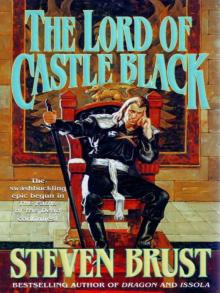 The Lord of Castle Black
The Lord of Castle Black To Reign in Hell: A Novel
To Reign in Hell: A Novel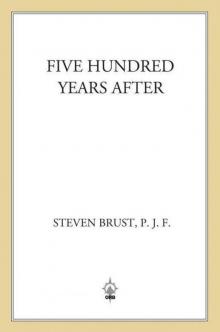 Five Hundred Years After (Phoenix Guards)
Five Hundred Years After (Phoenix Guards) The Book of Dzur: Dzur ; Jhegaala
The Book of Dzur: Dzur ; Jhegaala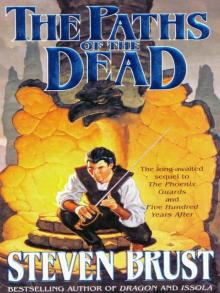 The Paths of the Dead
The Paths of the Dead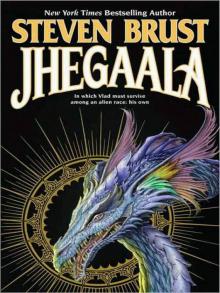 Jhegaala
Jhegaala The Desecrator: A Tor.com Original
The Desecrator: A Tor.com Original Agyar
Agyar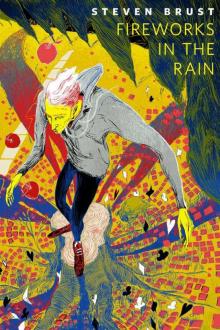 Fireworks in the Rain
Fireworks in the Rain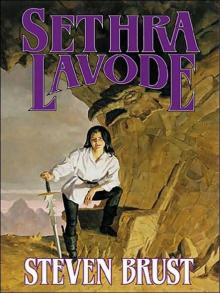 Sethra Lavode
Sethra Lavode The Book of Athyra
The Book of Athyra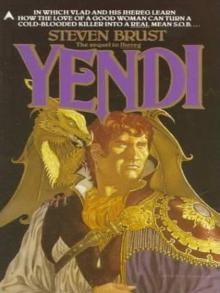 Yendi
Yendi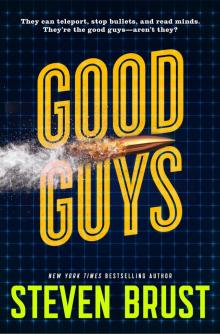 Good Guys
Good Guys The Book of Jhereg
The Book of Jhereg Cowboy Feng's Space Bar and Grille
Cowboy Feng's Space Bar and Grille Sethra Lavode (Viscount of Adrilankha)
Sethra Lavode (Viscount of Adrilankha) My Own Kind of Freedom
My Own Kind of Freedom Dzur (Vlad Taltos)
Dzur (Vlad Taltos) The Lord of Castle Black: Book Two of the Viscount of Adrilankha
The Lord of Castle Black: Book Two of the Viscount of Adrilankha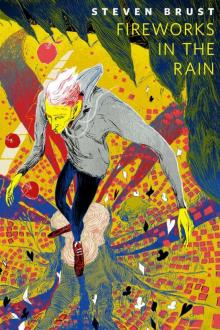 Fireworks in the Rain: A Tor.Com Original
Fireworks in the Rain: A Tor.Com Original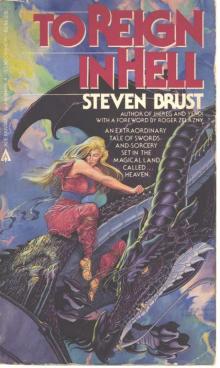 To Reign In Hell
To Reign In Hell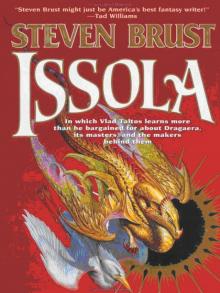 Issola
Issola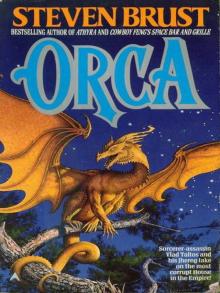 Orca
Orca Issola (Vlad Taltos)
Issola (Vlad Taltos)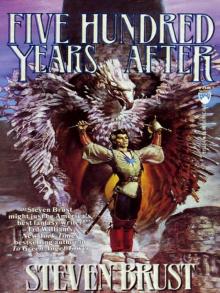 Five Hundred Years After
Five Hundred Years After The Phoenix Guards
The Phoenix Guards Taltos
Taltos![[Vlad Taltos 06] Athyra Read online](http://i1.bookreadfree.com/i1/03/24/[vlad_taltos_06]_athyra_preview.jpg) [Vlad Taltos 06] Athyra
[Vlad Taltos 06] Athyra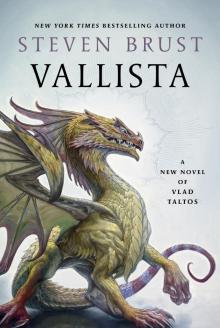 Vallista--A Novel of Vlad Taltos
Vallista--A Novel of Vlad Taltos The Incrementalists
The Incrementalists![[Vlad Taltos 04] Taltos Read online](http://i1.bookreadfree.com/i/03/24/[vlad_taltos_04]_taltos_preview.jpg) [Vlad Taltos 04] Taltos
[Vlad Taltos 04] Taltos![[Vlad Taltos 03] Teckla (v 1.1) Read online](http://i1.bookreadfree.com/i1/03/27/[vlad_taltos_03]_teckla_v_1_1_preview.jpg) [Vlad Taltos 03] Teckla (v 1.1)
[Vlad Taltos 03] Teckla (v 1.1) The Book of Taltos
The Book of Taltos The Paths of the Dead (Viscount of Adrilankha)
The Paths of the Dead (Viscount of Adrilankha) Jhegaala (Vlad Taltos)
Jhegaala (Vlad Taltos)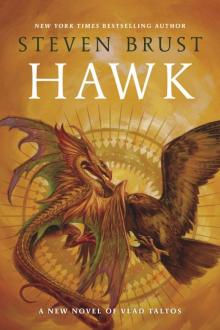 Hawk (Vlad)
Hawk (Vlad) Iorich
Iorich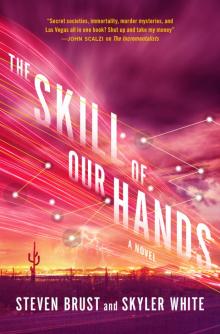 The Skill of Our Hands--A Novel
The Skill of Our Hands--A Novel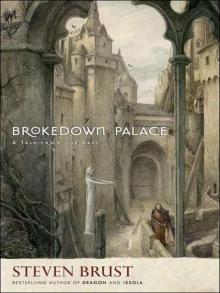 Brokedown Palace
Brokedown Palace Dragon (Vlad Taltos)
Dragon (Vlad Taltos) Dragon
Dragon Athyra
Athyra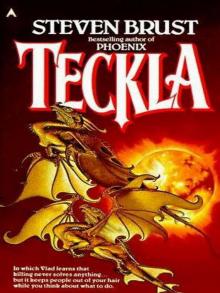 Teckla
Teckla Dzur
Dzur